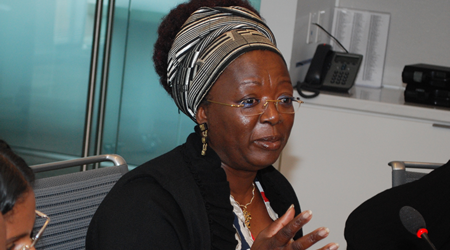Source: National Democratic Institute
The U.S.-Africa Leaders Summit brought government and civil society leaders from across Africa to Washington, D.C., earlier this month for a three day event, which highlighted Africa as an increasingly important actor in world affairs. The Summit also included forum discussions on the importance of civil society and women’s political participation.
NDI invited Mariam Dao Gabala, a renowned advocate for financial inclusion and women’s political participation in Cote d’Ivoire, to participate in the U.S.-Africa Leader Summit. While in Washington, she headlined an information session on Women, Peace and Democracy in Cote d’Ivoire at NDI.

NDI has conducted programming to increase women’s political participation in transitional institutions and processes throughout Africa. Programming in Côte d’Ivoire has supported women’s involvement in national reconciliation processes and contributed to women-led reconciliation initiatives at the local level through targeted technical assistance to elected women mayors.
Gabala is the president of Coalition des Femmes Leaders de Côte d’Ivoire, an organization that was created during the country's 2003 civil war to empower women to become involved at the top level of government. In an interview with NDI, Gabala spoke to about her work to support women’s political participation in her country, her hopes for the future, and thoughts on the Summit.
National Democratic Institute: We often talk about the value of women’s leadership in politics – in what ways have you seen women leading in Cote d’Ivoire?
Mariam Dao Gabala: I think the most recent example I have in mind is about the voting of the regional law on women and family. As you know, we went through a very difficult crisis [during 2010 post-election violence], and in the parliament we only had nine women...from different political parties. But when this law came to our desk we lobbied all the women and we told them, “you have to stand up, whatever your political party, because this one is a women’s [affairs issue]. So we would like you to push the law so that our country can ratify it.” It happened that even in that law, there was one contradictory article on citizenship. But all the women who were not in favor of the article, they all stood up and asked the parliament to vote on this law. It was going to be postponed for another time, but they all stood up and said, “we need this law to be voted on because it protects women’s rights.” I think when women come together they can push for transformation and they can push for change.
NDI: What role do you see for women in the future of Cote d’Ivoire?
Gabala: I think the main changes for me, I am the president of the woman leader caucus, and we really focus on women in the decision-making process because as women we are really everywhere. We are in health, we are in education, we are in promoting democracy. But at the decision level we are not there. When the decisions are taken, we are not there. When I think of a gender balanced parliament and a gender balanced society, I think we need both men and women to build a society; this is really one of my dreams. For me it is a waste, to lose all of this positive energy of women to build our society. This is really my dream for my country.
NDI: What strategies have you used to encourage men as allies or supporters?
Gabala: I think we engage them as trainers – it’s very good. When women listen to men, they [often hear men] take the women issue as a ghetto, not as a society issue. Because one of the main constraints, or obstacles, is that when we talk about women and we talk about gender, [men] think this is a women’s affairs and they put it in a ghetto. When men come up and talk about women then it becomes a society issue. For advocacy, for lobbying, we use men to help us.
NDI: What did you learn from your experience at the U.S.-Africa Leaders Summit?
Gabala: One major point is that we are facing the same problems all over Africa. For me, it means that instead of saying that Africa is a continent in crisis, I came out with the deep conviction that Africa is a continent under deep transformation. We need to have in mind that democracy is very young in Africa so for me our democracy is just like a teenage democracy. So we are facing a teenage crisis. If we understand that, we will be more positive in helping the continent get out of the crisis. We shouldn’t just want our continent to be like others in one day or two days – it is a deep transformation.
NDI: What has your experience been like working with NDI?
Gabala: So it has been a very good relationship. I am also a trainer for NDI for women. I think it is a great value to have NDI with us. As I told you it is a young democracy and we really need ourselves to learn about the basis of democracy, to be able to transform our society.
